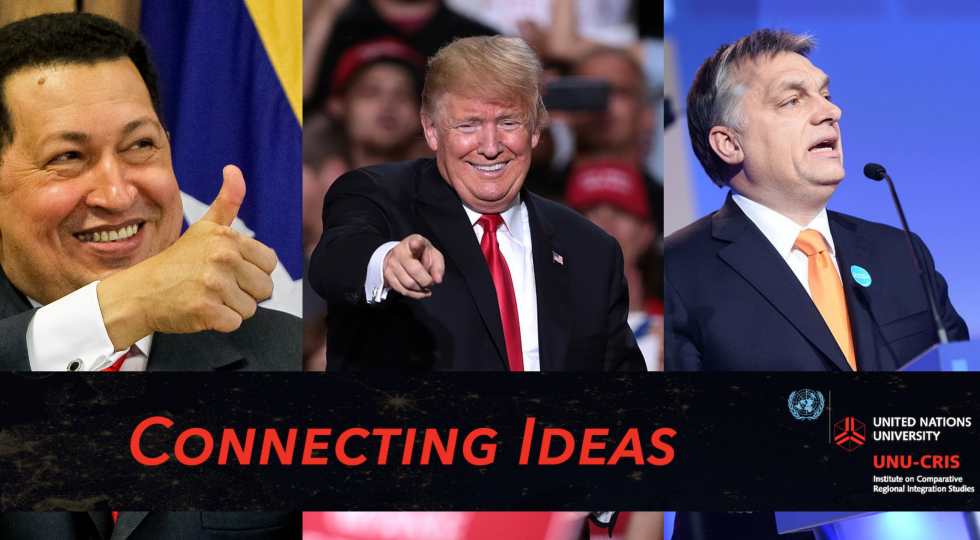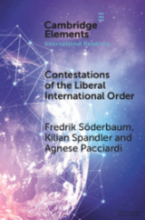Together for ‘the People’: Why Populists Cooperate Internationally

Image credit: Dilma Rousseff, CC BY-SA 2.0; Gage Skidmore from Peoria, AZ, United States of America, CC BY-SA 2.0; European People's Party, CC BY 2.0 (via Wikimedia Commons)

Fredrik Söderbaum
Associate Research Fellow, UNU-CRIS
Associate Professor at the School of Global Studies at the University of Gothenburg

Killian Spandler
Researcher, School of Global Studies, University of Gothenburg

This post draws on the recently published book, Contestations of the Liberal International Order: A Populist Script of Regional Cooperation, by Fredrik Söderbaum, Killian Spandler and Agnes Pacciardi (Cambridge University Press, 2021, ISBN 9781009030915). The book is open access from 1st – 15th June, 2021.
09 June 2021 | #21.09 | The views expressed in this post are those of the author and may not reflect those of UNU-CRIS.
A seemingly never-ending stream of observers claim that the populist emphasis on nationalism, identity and popular sovereignty undermines international collaboration and contributes to the crisis of the so-called Liberal International Order (LIO). Why, then, do populist governments continue to engage in regional and international organizations?
In our new book with Agnese Pacciardi, Contestations of the Liberal International Order: A Populist Script of Regional Cooperation, we contest the widespread image of the inward-looking populist who rejects international cooperation. Even former US President Donald Trump, who terminated his country’s relations with several United Nations bodies, maintained a robust level of engagement in many international organizations. As a matter of fact, it is safe to say that all populist leaders cooperate to some extent across borders. The book shows why and how some populist leaders actively promote it. For instance, Hugo Chávez, the late populist president of Venezuela, was a champion of cooperation among Latin American states and even created several new regional organizations. Other populist leaders, such as Viktor Orbán (Hungary) and Rodrigo Duterte (Philippines), use or reframe existing organizations for their own political goals.
Drivers of Populist Cooperation
In general, populist leaders mobilise support by portraying themselves as representatives of ‘the people’ in a struggle against ‘corrupt elites’. In many cases, international cooperation can help populist leaders project this idea of a people-elite antagonism. For instance, the Hungarian Prime Minister Viktor Orbán has fostered collaboration among Central and Eastern European states to defend their sovereignty against what he perceives as a detached and corrupt European Union (EU) elite in Brussels. Identity threats constitute another key driver of populist cooperation. Populists can, for instance, showcase international cooperation as a means to defend ‘the people’ against a threatening ‘Other,' that could cover anything from refugees and drug traffickers to muslims and ‘imperialists.’

Discussion between Viktor Orbán, on the left, and Ursula von der Leyen (President, European Commission). Image credit: European Commission (2021)
Institutional Preferences
The book provides ample empirical evidence that populists dislike international organizations with strong independent decision-making power like the EU. Instead, populists prefer institutional formats that strengthen the discretion and power of national governments and their leaders. This gives them more control and provides them with opportunities to cultivate their ‘strongman image’ at home. This is the logic behind Orbán’s sustained calls for returning EU competencies to the member states and political leaders.
Although there are some similarities with conventional intergovernmentalism, populists care less about broadly based ‘national interests’ and more about identity politics and popular sovereignty. Consequently, much of what populist leaders do on the international scene is symbolic. Public performances and grandiose rhetoric aimed at reinforcing the people-elite antagonism often trump actual problem-solving. With this said, the debate so far has ignored the fact that populists also have an interest in tackling real policy issues, as long as they consider it beneficial for ‘the people’. Because different populist leaders have greatly diverging views on who the people are and what problems they face, policies for the people can be anything from development programs for the poor in case of Chávez to tighter border control in case of Orbán. In our book we refer to this open- approach to problem-solving as cooperation à la carte.

(L-R) Presidents Hugo Chavez (Venezuela), Néstor Kirchner (Argentina) and Luiz Inácio Lula da Silva (Brazil) at a meeting in Granja do Torto (2006). Image credit: Ricardo Stuckert/PR, CC BY 3.0 BR, via Wikimedia Commons.
What is at Stake?
Populists have frequently challenged established international organizations – be it through public criticism, blocking decision-making, or in a limited number of cases, terminating their membership altogether. The proponents of these international and regional organizations and their member states currently do not have a clear plan of defense against the populist challenge. The crucial question is, whether it is more viable to push back against populist leaders – for example, with sanctions or membership suspensions – or choose a more inclusive approach that would cultivate the cooperative instincts of populist leaders. The danger with the latter approach is that concessions from non-populist governments, for instance, on immigration, may impinge on the rights of already vulnerable populations. At the same time, it is also clear that there is a need for more, not less international cooperation in today’s world politics.
Our book underlines the need for a better understanding not only of populism in world politics but also of LIO’s internal contradictions. Large parts of the political establishment, at least in the Western world, still think of the populist challenge in simple black-and-white terms: either we revive the liberal underpinnings of international institutions or the world will plunge into anarchy. The problem with this binary thinking is that it obscures how liberalism itself has produced many of the social conditions that have facilitated the rise of populism, like economic inequality and the forceful transformations caused by unrestrained globalization. Dividing the world into ‘good liberals’ and ‘bad populists’ may in fact further antagonize dissatisfied people and drive them into the arms of populist leaders. We need to find ways to address the problematic aspects of populism without falling back on the notion that a simple return to traditional liberal ideas is the answer to today’s complex global challenges.
Watch the video abstract and read the open access book (1st-15th June).
